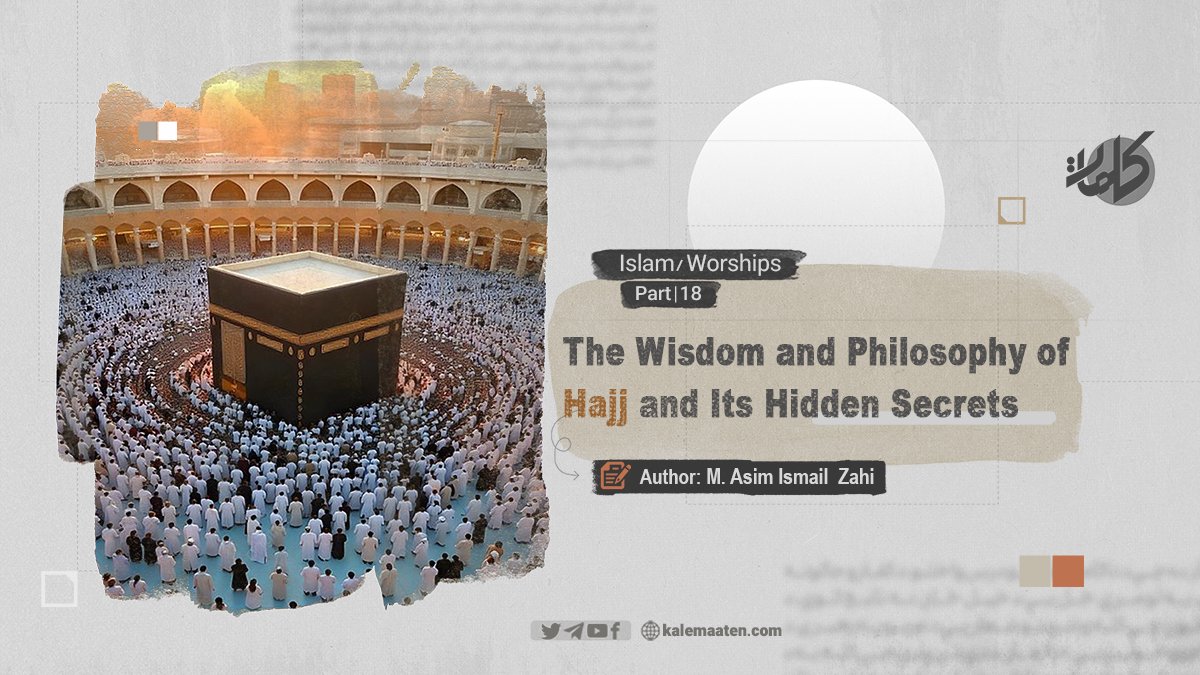
Author: M. Asim Ismail Zahi
The Wisdom and Philosophy of Hajj and Its Hidden Secrets (Part 18)
Doubt 3: Do Muslims Worship the Ka’ba?
Explanation of the Doubt:
Some claim that circumambulating the Ka’ba (Tawaf) is, in reality, a form of worship of the structure itself. If Muslims claim to worship God, why then do they worship His House?
Response:
The Ka’ba itself is not the object of worship; rather, the intended object is Allah, the Exalted. The Ka’bah merely serves as a means to unify the direction of worship (Qiblah), enabling all Muslims to worship in harmony and uniformity.
No one has the right to object to why the Ka’ba was chosen as the Qiblah. The response is simple: we had to face some direction in our prayers, and Allah, the Exalted, chose the Ka’ba. Had He chosen any other place, atheists would still have questioned why that specific location was chosen. What follows are several points that clarify that the Ka’ba is not the object of worship; rather, it is Allah alone who is worshipped:
1. The Prophet of Islam (peace and blessings be upon him) and the Muslims prayed toward Bayt al-Maqdis (Jerusalem) for approximately 16 or 17 months. If the Ka’ba itself were the object of worship, why then did they face another direction? This proves that Muslims offer prayer to Allah, not to the Ka’ba.
2. If the Ka’ba itself were worshipped, why is it impermissible to touch and wipe it except for the Black Stone (Hajar al-Aswad)? Why are Muslims forbidden from swearing an oath by the Ka’ba itself, but instead must swear by the “Lord of the Ka’ba”?
3. We clearly reject the divinity of the Ka’ba. It is evident that no true worshipper would ever deny the divinity of what they worship. Thus, the Ka’ba is not divine and is not an object of worship.
4. Hypothetically, if the Ka’ba were to be destroyed one day, Muslims would still continue to pray in the direction where it once stood. If the structure itself were the object of worship, worship would cease with its destruction. Therefore, Muslims do not worship bricks and stones.
5. If someone prays on the rooftop of the Ka’ba, their prayer remains valid. If the Ka’ba were the object of worship, ascending above it and performing prayer there would be inappropriate, as it would no longer be in front of the worshipper. Moreover, stepping above a deity—even with a respectful intention—would be considered an act of disrespect. However, because the Ka’ba is not divine, during the early days of Islam, the muezzins (callers to prayer) would ascend it to make the call to prayer (Adhan).
Doubt 4: Why Are Non-Muslims Not Allowed to Enter Makkah and Madinah?
1. In every country, there are restricted areas where even its own citizens are not allowed access, let alone foreigners. For example, military zones or special camps are limited to authorized personnel only. Islam is a universal religion that has its own sacred headquarters—namely, the holy cities of Makkah and Madinah. Only Muslims are permitted to enter these sacred areas, and others have no grounds for objection.
2. When someone wishes to enter a foreign country, they are required to obtain a visa, and every country has its own rules and conditions for issuing one. If those requirements are not met, entry is denied. Makkah and Madinah have their own spiritual entry conditions. Whoever accepts the “visa” of Makkah and Madinah must also abide by their laws. The “visa” for these sacred cities is very simple: proclaiming «لا إله إلا الله محمد رسول الله» Translation: “There is no god but Allah, and Muhammad is the Messenger of Allah.”
Continues…


